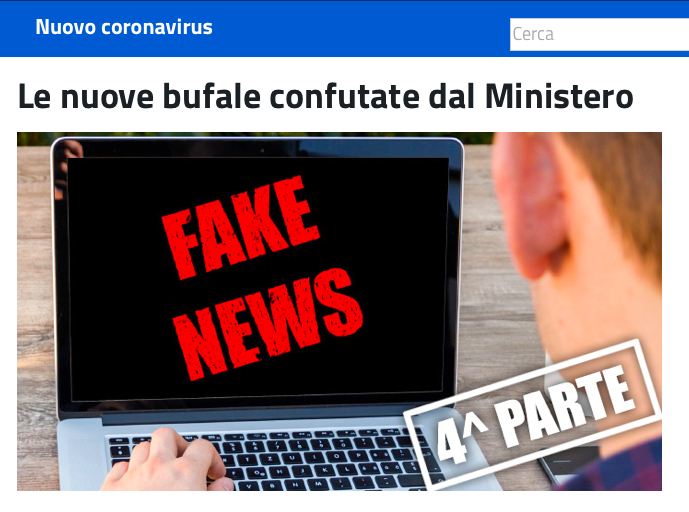On March 25, 2020, Dr. Giancarlo Isaia and Dr. Enzo Medico, professors at the University of Turin, presented to the Academy of Medicine of Turin a document under the title "Possible preventive and therapeutic role of vitamin D in the management of the COVID-19 pandemic." https://www.accademiadimedicina.unito.it/images/img/pdf/Ipovitaminosi_D_e_Coronavirus_25_marzo_2020.pdf
It was a short, moderate and cautious document; on the basis of numerous articles published in medical publications, it invited the medical-scientific community to consider the relationship between vitamin D deficiency and respiratory illnesses. They proposed a list of foods rich in vitamin D and recommended vitamin D supplements, especially to the elderly and all health personnel, and ”always under medical supervision."
On May 13, Dr. Isaiah told Il Giornale: "Criticism has also rained down because there are those who rightly want a scientific demonstration. But the task of the Academy of Medicine is not to do scientific studies but to propose themes.” Dr. Isaia added that patients positive to the virus had very low vitamin D levels. https://www.ilgiornale.it/news/cronache/vitamina-d-aiuta-contro-covid-ecco-cosa-dicono-studi-1862470.html
While some of the criticism was dismissive or even insulting, even more damaging was the response of the Ministry of Health: in March, they had created a long list of “cures” proposed by malevolent jokers, nice thoughts like gargling with bleach or drinking methanol. To that list, they added the hypothesis of Isaiah and Medico: "fake news” all of them. http://mautino-lescienze.blogautore.espresso.repubblica.it/2020/03/27/vitamina-d-e-coronavirus/
On April 9, the Ministry published "New hoaxes refuted by the Ministry,” citing the phrase “Vitamin D protects against infection by New coronavirus.“ They added, in red, the mark " False!" and the comment "there is currently no scientific evidence that vitamin D plays a role in protecting against the new coronavirus infection.” http://www.salute.gov.it/portale/nuovocoronavirus/dettaglioContenutiNuovoCoronavirus.jsp
The two university professors were warning the medical community and the country of a disastrous mistake. They wanted to start discussion and research on one of the least expensive drugs in the world, which could be immediately produced in Italy. All this was denied, when the Ministry threw the hypothesis of Isaia and Medico into the trash, with bleach and methanol.
Without clear motive, argument, theory, or evidence, the Ministry of Health had decided that the relationship between deficiency in vitamin D and respiratory infections, which was known and recognised in 2019, had become invalid in 2020. Yet, that “scientific evidence” which the Ministry was demanding was available, and was growing.


Vitamin D
Use of supplements[edit]
Supplementation with vitamin D is a reliable method for preventing or treating rickets. The effects of vitamin D supplementation on non-skeletal health are uncertain.[58][59]
In 2017, the study of A. Martineau et al. appeared in the British Medical Journal, under the title “Vitamin D supplementation to prevent acute respiratory tract infections.” The study looks at data from 25 studies, randomised and placebo-controlled, on almost 11,000 subjects aged 0 to 95 years. Conclusions: "Vitamin D supplementation was safe and it protected against acute respiratory infections overall.” Vitamin D supplements lower viral replication rates, reduce inflammation, stimulate the immune system, and result in infections decreasing by 70%, for those who were very D-deficient, at a level below 10 ng/ml. Such success is lacking when vitamin D is given in bolus form, in large monthly doses. https://www.bmj.com/content/356/bmj.i6583
Against ivermectin and HCQ, Pharma's choice weapon is contemptuous ridicule, while against vitamins and zinc the choice is uncertainty. In the face of overwhelming evidence that vitamin D and vitamin C and zinc are most important in the prevention and cure of Covid-19, they decided to say that the amounts required for health have not been determined as yet.
A 2013 review did not find any effect from supplementation on the rates of non-skeletal disease, other than a tentative decrease in mortality in the elderly.[60] Vitamin D supplements do not alter the outcomes for myocardial infarction, stroke or cerebrovascular disease, cancer, bone fractures or knee osteoarthritis.[14][61]Some researchers claim the IOM was too definitive in its recommendations and made a mathematical mistake when calculating the blood level of vitamin D associated with bone health.[63] Members of the IOM panel maintain that they used a "standard procedure for dietary recommendations" and that the report is solidly based on the data. Research on vitamin D supplements, including large-scale clinical trials, is continuing.[63]
Low vitamin D levels may result from disease rather than cause disease.[60]
The IOM has been the major obstacle to progress in the recognition of the importance of vitamin D, particularly in regard to respiratory infections.
An argument, by which IOM scientists try to explain the correlation between illness and low vitamin D levels, is to say that it's the illness that causes the loss of vitamin D.
In the case of Covid-19 that's not tenable, since the low levels were present in most people of the same class before the illness. Chronic hypovitaminosis was shown to be present in all sectors of the population .
This was confirmed in a 2020 article in Journal of Endocrinological Investigation under the title "Vitamin D deficiency as a predictor of poor prognosis in patients with acute respiratory failure due to COVID-19": High prevalence of hypovitaminosis D was found in COVID-19 patients with acute respiratory failure, treated in a RICU. Patients with severe vitamin D deficiency had a significantly higher mortality risk. Severe vitamin D deficiency may be a marker of poor prognosis in these patients, suggesting that adjunctive treatment might improve disease outcomes. https://pubmed.ncbi.nlm.nih.gov/32772324/




